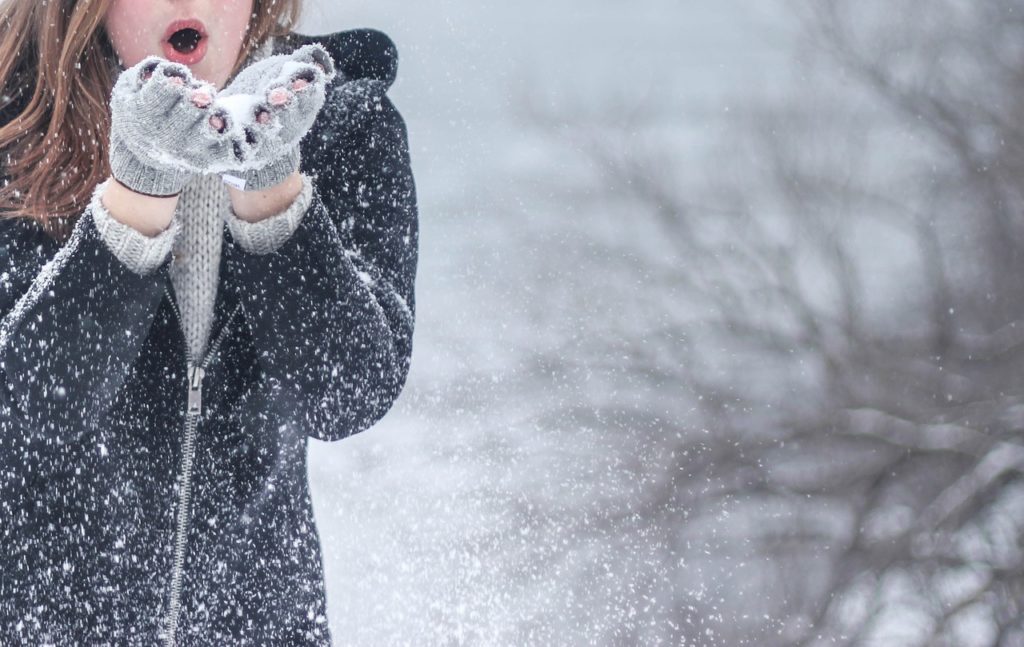Winter Weather’s Effect on your Body

By Dr. Janine Pulley
I have heard the question, “do you think the weather could have something to do with it?” frequently this winter. The short answer is “yes.”
Traditional Chinese Medicine (TCM) recognizes that there are three causes of disease: internal, external, and neutral causes.1
Internal causes of disease originate from within the body when there is damage to one or more of the seven affects – joy, anger, anxiety, fear, fright, thought, and sorrow. These seven affects are a person’s normal emotional and mental response to their environment. When someone’s mental-emotional response is excessively intense or persistent, the affects can disrupt the body’s internal balance to cause dysfunction and disease.1
Neutral causes of disease are a result of a lack of restraint in your daily life, such as dietary irregularities (under-eating, over-eating, skipping meals, etc.), taxation fatigue (mental or physical overexertion), and sexual intemperance (both overindulgence in sex and giving birth to more children than your body can bear).1
External causes refer to “evils” that can assault your body from the outside, which include the six excesses or evils and pestilential qi (parasites). TCM recognizes six excesses that can affect your body: wind, heat, cold, summerheat, dampness, and dryness. Winter weather falls into this category.1
Think about what you often experience during the winter: cold temperatures, biting wind, and heavy snow. Cold, wind, and dampness. Understanding these evils is intuitive because they are very similar to what we experience in nature every day. They share similar properties with what you already know.
Cold evil is associated with low temperatures, the slowing down of activity, and congealing. If you are outside shoveling snow, you have already experienced the nature of cold – the temperature is below freezing, you do not move around as fast as usual, and moisture congeals on your clothes and body to form ice. When you have a cold excess that has invaded your body, you will experience similar symptoms: desire for warmth, aversion to cold, contraction and tightness of your muscles, and cold and pain in the affected areas (such as your fingers, toes, ears, and nose). Next time you are outside for a while, try to notice these signs you might have missed before that are due to the cold weather: cold, thin, clear nasal discharge, clear urine, or clear watery diarrhea.1
Wind as an evil we frequently encounter all times of the year. Just like the natural phenomenon, wind moves swiftly, comes and goes quickly, intermittently blows, and sways the branches of trees. Signs and symptoms of wind reflect this nature: the disease comes on quickly and changes rapidly, dizziness, convulsions, tremors, itching, and wandering pain. Wind can invade from the outside or be generated internally. When it invades from the outside, it can often carry cold or heat evil in with it (presenting as the common cold or flu, respectively).1

Dampness is a stubborn evil just like damp is in nature. It is also seasonal like in nature – it occurs when the weather is damp or wet, such as high humidity in the summer, rain in the spring and fall, and heavy snow in the winter. Just like the other evils, damp does to the body what it sounds like. Dampness is persistent, viscous, and clammy – so diseases involving dampness are persistent and difficult to cure (or stubborn). Dampness also tends to stagnate and get stuck, which can result in fatigue, foggy or heavy-headedness, heaviness of the body and limbs, aching joints, and trouble stretching or bending. It can also accumulate locally, resulting in swelling of the legs, exudating sores, or vaginal discharge.1
Your body’s digestive organ, the (TCM) Spleen is particularly susceptible to dampness, so people often experience digestive issues as well. Some of these symptoms are indigestion, poor appetite, reflux, nausea, heaviness or fullness in the chest or abdomen, sloppy stool, and scanty urine.1
So the long answer is “yes,” your body is definitely affected by the winter weather. What you are experiencing – whether it is pain, headaches, anxiety, PMS, getting sick easily, trouble sleeping, or something else – is due to your body being out of balance. The cold, windy, damp weather can further push your body out of balance, which can aggravate your condition. So your pain is more severe, you have anxiety more often, your headaches are lasting longer, etc. The cold and dampness both slow down and hinder your ability to heal, which is why you may feel like you are not making the progress you were expecting with your care.
The best thing you can do this winter is take care of yourself – mentally, emotionally, and physically. Make sure that you are eating healthy foods, getting enough sleep, exercising at least a little bit daily, meditate, do something fun every day, and continue your regular treatments. When your spine is aligned by your chiropractor, your central nervous system can function at its highest level, meaning that your whole body is performing at its best, so you can fight off these winter colds better. When your body’s energy or qi is balanced, you will feel better and get sick less easily as well, so keeping with your regular acupuncture treatments is important.
If you build these good habits now and take care of yourself this winter, spring will come and you will spring forward (pardon the pun) on your path of healing!
Dr. Pulley is always more than happy to discuss tailored recommendations for you, so call 978-237-5106 today to schedule your appointment today!
1. Wiseman N, Ellis A. Fundamentals of Chinese Medicine. Brookline, MA: Paradigm Publications; 1996; pp.77-88.


